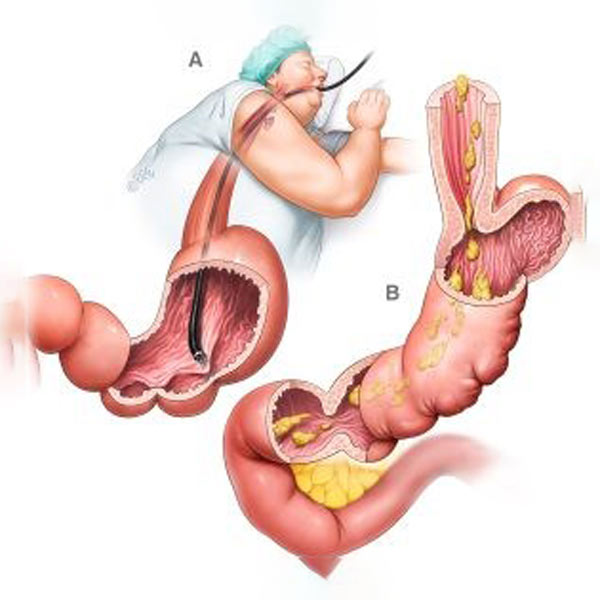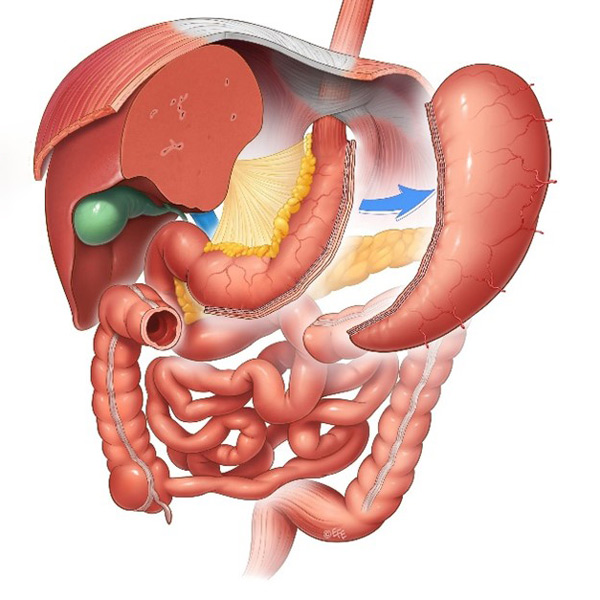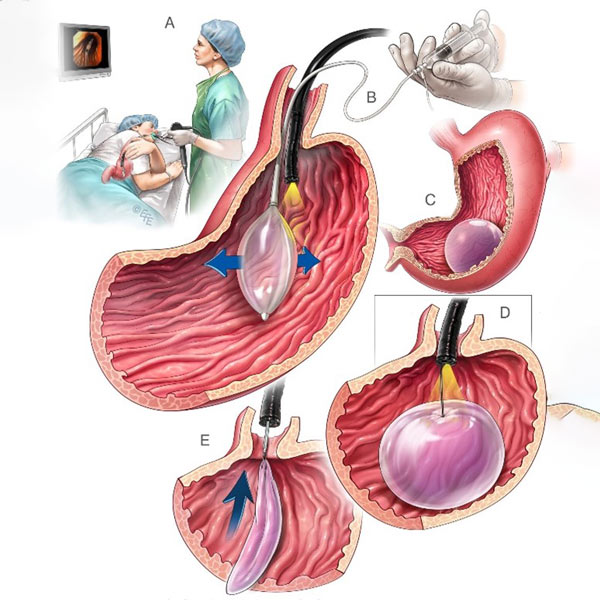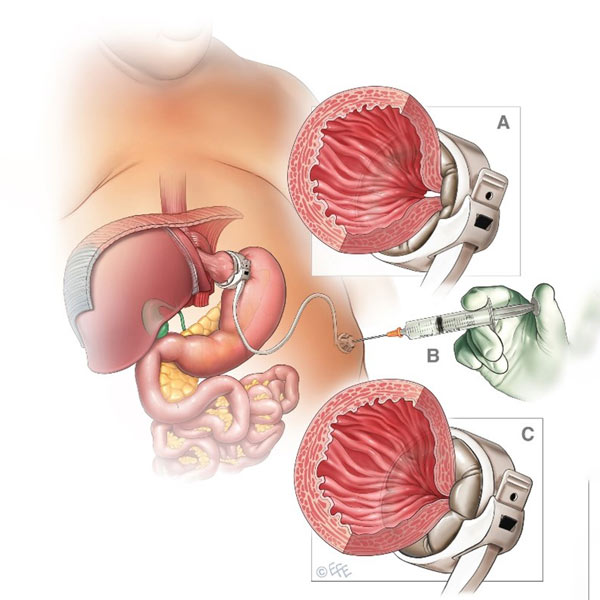Weightloss
Gastric Bypass
Roux-en-Y gastric bypass has been performed worldwide for over 50 years. It generally takes under two hours to perform. The procedure consists of making a small stomach referred to as the gastric pouch. The small intestine is rerouted, diverting food past the majority of the stomach and a small portion of the small intestine.

Gastric Bypass Pros & Cons
PROS (leftColumn)
- Mortality < 0.2%, major complication <5%
- Long-term weight loss
- Treatment for acid reflux
- Elimination of obesity-related diseases
CONS (RightColumn)
- Risk of some vitamin and mineral deficiencies
- Risk of gallstones
- Risk of ulcers if taking NSAIDs or smoking
- Bowel obstruction
- Dumping syndrome

Endoscopic Sleeve Gastroplasty (ESG)
Endoscopic Sleeve Gastroplasty (ESG) is a purely endoscopic procedure with no incisions or stomach stapling that reconstructs your stomach into a smaller chamber. ESG can shrink the stomach size by 70-80% and patients can expect to lose between 15-20% of their total body weight. It is an outpatient procedure that offers significant weight loss results with lower risks of complications and shorter recovery time. A large study was able to demonstrate excellent weight loss and resolution of medical comorbidities.
The recovery time after ESG is shorter than for bariatric surgical procedures so patients can return to their normal routine much faster. You can be back to your normal routine in a matter of a few days after the procedure.
How Is ESG Performed?
ESG is performed using an endoscope placed through the mouth that works in conjunction with a suturing device. The large portion of the stomach is sutured, or plicated, creating a much smaller chamber for food to be stored (see image above). This makes patients feel full faster and slows down gastric motility.
Who Is ESG For?
The ESG procedure is performed on patients looking to kick-start their weight loss journey. Generally, this procedure can be done on patients with a BMI ranging from 27-50. Dietary changes and lifestyle modifications will need to be made in order for sustained weight loss in the long term. This procedure can often be “adjusted” in the long term to re-instill the feeling of restriction that the patient felt immediately following their initial procedure if needed.
Is ESG covered by Insurance?
ESG is a newly FDA-approved procedure. New procedures are rarely embraced quickly by insurance companies, but Medicare has created a code that may allow it to be reimbursed in the near future. For now, it is a self-pay procedure. Come talk to us about kickstarting your weight loss with a non-surgical procedure!

Sleeve Gastrectomy Surgery
Achieve long-term weight loss in Naples and Fort Myers with sleeve gastrectomy surgery. Commonly referred to as the gastric sleeve procedure, sleeve gastrectomy involves reshaping the stomach into a small and slender tube while 85 percent of the outer portion of the stomach is removed. Much like LAP-BAND surgery, this limits the amount of food the stomach can hold in one sitting while increasing feelings of satiety or fullness after smaller meals.
Benefits of Sleeve Gastrectomy
Unlike other restrictive weight loss procedures like LAP-BAND, sleeve gastrectomy does not require periodic adjustments after surgery. Additional benefits of laparoscopic sleeve gastrectomy surgery are:
- Minimally invasive procedure
- Reduced risk of infection
- No medical devices in the body
- Reduced risk of vitamin deficiency
What does Sleeve Gastrectomy entail?
We use minimally invasive surgical techniques to make several small incisions in the abdomen. We remove the outer curvature of the stomach, leaving only a slender portion of the stomach in the shape of a sleeve or tube. This laparoscopic procedure can successfully reduce the amount of food that can be eaten at one time while also reducing stomach hunger hormone production. These aspects of sleeve gastrectomy make it easier for patients to practice portion control and avoid overeating.
What to expect from Sleeve Gastrectomy surgery?
Though individual results will vary, your sleeve gastrectomy surgery can help you achieve significant weight loss results. On average, most patients of laparoscopic sleeve gastrectomy can expect to lose between 50 and 70 percent of their excess body weight within the first six to twelve months following surgery. Sleeve gastrectomy can also help resolve many existing weight-related health complications such as:
- High blood pressure
- Type 2 diabetes
- Sleep apnea
- High cholesterol
- Risks of Sleeve Gastrectomy
The decision to have a gastric sleeve procedure for weight loss is a significant one. You should be fully informed of both the benefits and the risks associated with this surgery before you decide if this is the right weight loss solution for you. We will carefully review any risks or complications associated with the procedure so that you are aware of any potential issues prior to your operation.

The ORBERA™ System
ORBERA™ is a new incisionless, non-surgical option that gives you that edge. That boost. That momentum you need to amplify all of your weight-loss efforts and develop a more confident, healthier lifestyle.
How Does ORBERA Work?
The ORBERA procedure is a comprehensive two-part program, starting with a soft silicone balloon placed temporarily in the stomach for six months to encourage portion control.

What Does the ORBERA Program Include?
The Support Team of Experts
Once the balloon is placed, patients will receive a customized plan and coaching from a support team of experts which may include a dietician, psychologist, and exercise physiologist.
What is a LAP-BAND procedure?
Lose excess weight with minimally invasive LAP-BAND surgery, the only adjustable and reversible weight loss surgery.
With more than 600,000 procedures performed worldwide, The LAP-BAND System is one of the most popular and successful laparoscopic gastric band surgeries available to patients in the Ft. Myers and Naples area.
A restrictive form of weight loss surgery, LAP-BAND helps those carrying excess pounds lose weight by reducing the amount of food that can be consumed. LAP-BAND surgery also helps you feel full for longer, prompting you to eat less often throughout the day without feeling hungry.
LAP-BAND surgery at GI Surgical Specialists involves the implantation of a fully adjustable medical device known as a “gastric band” around the upper portion of the stomach during a minimally invasive operation.
During laparoscopic gastric band surgery, your surgeon will use a laparoscope, a thin, flexible tube equipped with a light, camera and other surgical tools to guide the gastric band into place. This camera transmits information to a video screen so the surgeon can view the surgical area and perform the procedure. At this time, your weight loss surgeon will also implant a fill port directly beneath the surface of the abdominal skin along with tubing to connect the port to the gastric band. Once the band and port are in place, your weight loss surgeon can adjust and tighten the band to reduce the amount of food you can eat by injecting sterile saline (salt water) into the fill port.
The objective of the LAP-BAND procedure is to create a stomach pouch that can only hold a small amount of food, thereby reducing the stomach’s food storage capacity. Your gastric band will also control the stoma or stomach outlet between the newly created smaller pouch and the lower part of the stomach. The smaller your stomach pouch the faster you will feel full and the slower food will take to move between the upper and lower portions of the stomach during digestion. Thanks to your LAP-BAND, you will feel full, eat less and finally lose weight.
Benefits of Endoscopic Revision
The incisionless revision offers the following benefits:
- No scarring
- Minimal postoperative pain
- Outpatient procedure
- No risk of infection
- Reduced risk of complications
- Cure Dumping Syndrome (bypass)
Dumping Syndrome After Gastric Bypass
Bariatric surgery, particularly gastric bypass surgery, has become an increasingly popular and effective method for combating severe obesity. While it offers numerous benefits in terms of weight loss and improved health, there are potential consequences that patients should be aware of. One such is dumping syndrome.
What is Dumping Syndrome?
Bariatric surgery, particularly gastric bypass surgery, has become an increasingly popular and effective method for combating severe obesity. While it offers numerous benefits in terms of weight loss and improved health, there are potential consequences that patients should be aware of. One such is dumping syndrome.
Causes of Dumping Syndrome
Dumping syndrome can be categorized into two types: early dumping syndrome and late dumping syndrome. Each type has different underlying causes and symptom presentations.
Early Dumping Syndrome: Early dumping syndrome occurs within 10 to 30 minutes after eating. It is primarily caused by the rapid transit of undigested food from the stomach to the small intestine. The surge of carbohydrates into the small intestine triggers the release of hormones, resulting in symptoms such as nausea, vomiting, abdominal cramps, diarrhea, dizziness, lightheadedness, and rapid heart rate.
Late Dumping Syndrome: Late dumping syndrome usually occurs 1 to 3 hours after a meal and is linked to reactive hypoglycemia. After eating a high-carbohydrate meal, the pancreas releases an excessive amount of insulin, causing blood sugar levels to drop rapidly. Symptoms of late dumping syndrome may include weakness, sweating, confusion, shakiness, and palpitations.
Managing Dumping Syndrome
While dumping syndrome can be distressing, there are several strategies that we can help manage and alleviate its symptoms:
Dietary modifications:
- Eat smaller, frequent meals throughout the day.
- Consume protein-rich foods and healthy fats to slow down digestion.
- Avoid high-sugar and high-carbohydrate meals that trigger symptoms.
- Drink liquids between meals rather than with meals.
Lifestyle adjustments:
- Chew food thoroughly and eat slowly to aid digestion.
- Avoid lying down after meals.
- Engage in regular physical activity to help regulate blood sugar levels and aid digestion.
Medications:
Your healthcare provider may prescribe medications like acarbose to slow down carbohydrate absorption or octreotide to reduce the release of insulin.
Endoscopic Bypass Revision (TORe):
By shrinking the gastric pouch and connection to the small bowel, this procedure will allow the stomach to hold on to food longer, slowing the fast transit of food down the intestinal tract. Research has shown TORe to be very effective for dumping syndrome. Patients with dumping and weight regain after gastric bypass would get double the benefit of this procedure!
Dumping syndrome is a rare issue following gastric bypass surgery, but with lifestyle adjustments, medications or a TORe procedure in Fort Myers, FL you can be fixed! If you experience any symptoms, we are here to help.
Medical Weight Loss
Medical weight loss provides an alternative to weight loss surgery for patients wishing to take a more conservative approach to weight loss or to combine medications with weight loss procedures to achieve a more robust weight loss success!
Using calorie controlled diets, nutrition education and behavior counseling, our medical weight loss options are tailored to your individual needs and offer long-term success with the support of our entire medical weight loss team.
Semaglutide (Ozempic/Wegovy)
A Game-Changer in Weight Management
Semaglutide, originally developed as a treatment for type 2 diabetes, has garnered attention for its remarkable efficacy in promoting weight loss. Marketed under the brand name Wegovy, this once-weekly injectable medication belongs to a class of drugs known as glucagon-like peptide-1 receptor agonists (GLP-1 RAs).
GLP-1 RAs work by mimicking the action of incretin hormones, which regulate blood sugar levels and appetite. By stimulating insulin secretion and decreasing glucagon production, semaglutide helps control blood glucose levels. Additionally, it acts on areas of the brain involved in appetite regulation, leading to reduced food intake and increased feelings of satiety.
Clinical trials have demonstrated the impressive weight loss potential of semaglutide. In the STEP (Semaglutide Treatment Effect in People with obesity) trials, participants treated with semaglutide achieved substantial weight loss compared to those receiving a placebo. Furthermore, many individuals experienced improvements in cardiometabolic risk factors such as blood pressure and cholesterol levels.
Tirzepatide (Mounjaro/Zepbound)
The Next Frontier in Weight Management
Tirzepatide represents another promising addition to the arsenal of medications for weight loss. Developed by Eli Lilly and Company, this investigational drug combines the actions of two hormones: glucagon-like peptide-1 (GLP-1) and glucose-dependent insulinotropic polypeptide (GIP).
Like semaglutide, tirzepatide works by targeting multiple pathways involved in metabolism and appetite regulation. By stimulating insulin secretion, inhibiting glucagon release, and slowing gastric emptying, it helps lower blood sugar levels and reduce food intake. Additionally, its dual agonism of GLP-1 and GIP receptors may offer synergistic effects on weight loss.
Preliminary data from clinical trials suggest that tirzepatide holds great promise for weight management. In phase 3 studies, participants treated with tirzepatide achieved significant reductions in body weight compared to those receiving a placebo or other antidiabetic medications. Moreover, improvements in glycemic control and cardiovascular risk factors were observed, highlighting the potential for comprehensive metabolic benefits.
Benefits of Medical Weight Loss
By losing as little as five to ten percent of your excess body weight, you can significantly improve your health and well-being. Even a modest amount of weight loss reduces your risk for developing common health concerns related to obesity such as heart disease, type 2 diabetes, gallstones, sleep apnea, strokes and some forms of cancer. Additionally, losing weight with the help of medical weight loss has the potential to improve your mental health by offering improved self-esteem and reduced risk of anxiety and depression.
Semaglutide and Tirzepatide can be used in combination with weight loss procedures. Whether taken before, to lower your pre-surgery BMI or after in those struggling to shed those last few pounds, combination therapy is the new weight loss frontier.
